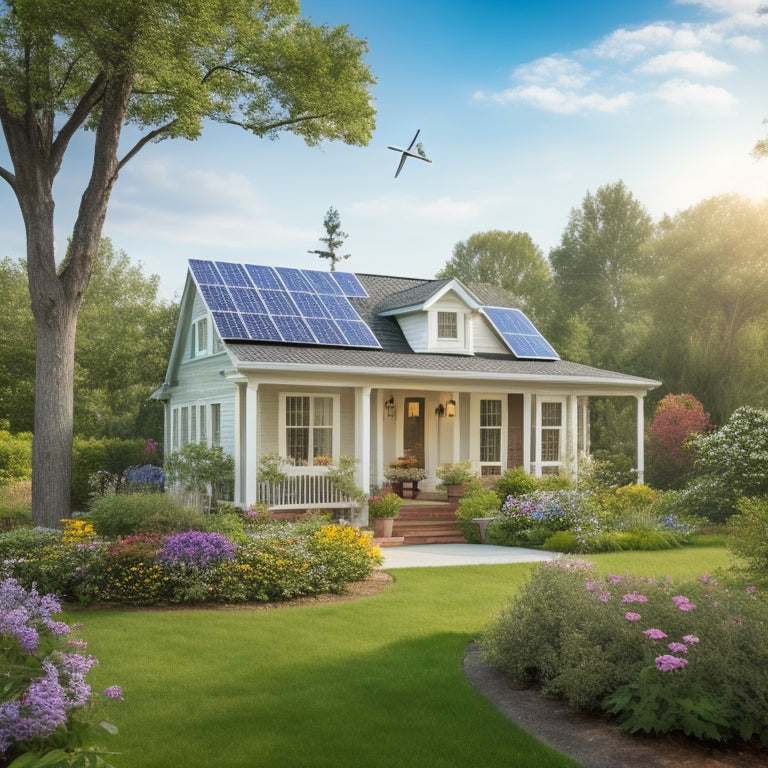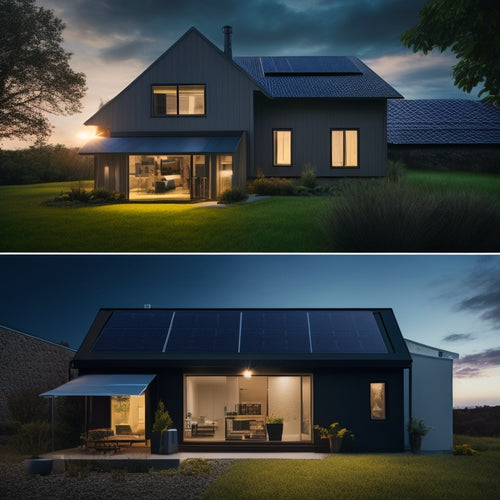
Why Invest in Renewable Energy at Home?
Share
By investing in renewable energy at home, you can save up to 50% on energy costs, increase your property value by up to 17%, and reduce your carbon footprint. You'll also gain energy independence, controlling your energy consumption and costs. Plus, government incentives can greatly reduce the upfront costs of renewable systems. As you shift to a more sustainable lifestyle, you'll not only contribute to climate change mitigation but also enhance your financial well-being. Now, uncover how you can tailor a renewable energy system to suit your specific needs and reap the rewards of a greener future.
Key Takeaways
- Investing in renewable energy at home can lead to significant cost savings, up to 50% on energy bills, and long-term financial benefits.
- Renewable energy systems increase property value, making homes more attractive to buyers and potentially selling for up to 17% more.
- Adopting renewable energy reduces reliance on fossil fuels, decreasing greenhouse gas emissions and contributing to climate change mitigation.
- Renewable energy provides energy independence, allowing homeowners to control their energy consumption and costs, and reducing dependence on fossil fuels.
- Government incentives, such as tax credits and rebates, make investing in renewable energy more affordable and financially viable for homeowners.
Renewable Energy Saves Money
Your energy bills are likely one of your largest monthly expenses, but investing in renewable energy at home can greatly reduce them. By utilizing natural resources like solar or wind power, you can considerably lower your utility bills.
In fact, homeowners who invest in renewable energy can save up to 50% on their energy costs. Additionally, with the help of solar battery storage systems, you can store excess energy generated by solar panels for later use, further reducing your reliance on the grid.
These cost savings can add up over time, resulting in substantial long-term benefits. Additionally, many governments offer incentives and tax credits to homeowners who invest in renewable energy, further increasing the potential cost savings.
Increase Property Value Long-Term
In addition to reducing energy costs, investing in renewable energy at home can also have a significant impact on your property's value.
As property market trends continue to shift towards sustainability, having a renewable energy system installed can be a major selling point for potential buyers. In fact, many homebuyer preferences now prioritize energy efficiency and eco-friendliness, driven in part by the desire to decrease carbon footprints and reduce reliance on fossil fuels.
Furthermore, solar energy allows for better control over energy costs, ensuring predictable budgeting. By investing in renewable energy, you're not only reducing your carbon footprint but also increasing your property's appeal and value.
According to recent studies, homes with solar panels or other renewable energy systems can sell for up to 17% more than similar homes without them. This means that your investment in renewable energy can lead to a significant return on investment when you decide to sell your property.
Reduce Carbon Footprint Now
Utilizing renewable energy at home enables you to reduce your carbon footprint immediately, making a tangible impact on the environment.
By adopting sustainable practices, you'll greatly decrease your reliance on fossil fuels, which are primary contributors to greenhouse gas emissions. This reduction in emissions translates to a lower environmental impact, helping to combat climate change and preserve natural resources for future generations.
As you invest in renewable energy, you'll be doing your part to mitigate the devastating effects of pollution and habitat destruction.
Additionally, off-grid solar systems considerably reduce carbon footprint and promote guilt-free power consumption, which aligns with sustainable living values.
Energy Independence Is Key
Renewable energy at home not only reduces your carbon footprint but also enables you to break free from reliance on the grid.
You'll have more control over your energy consumption and costs, enhancing your energy security. This independence is vital for sustainable living, as you'll be less affected by price fluctuations and supply disruptions.
With renewable energy, you can generate your own power and store excess energy for later use. This self-sufficiency reduces your reliance on fossil fuels and lowers your exposure to market volatility.
Government Incentives Abound
You're likely to find that investing in renewable energy at home becomes more attractive when you factor in the various government incentives available.
These incentives can greatly reduce the upfront cost of installing renewable energy systems, making them more accessible to homeowners. For instance, you may be eligible for tax credits, which can provide a notable reduction in your tax liability.
Additionally, many governments offer rebate programs that provide a direct refund for a portion of your investment. By taking advantage of these incentives, you can offset a substantial portion of the initial cost of your renewable energy system, making it a more financially viable option.
Frequently Asked Questions
Can I Install Renewable Energy Systems Myself to Save Costs?
As you commence on a DIY quest for energy independence, be cautious: while installing renewable energy systems yourself can be a cost-saving strategy, it's essential to guarantee you have the necessary knowledge to avoid costly mistakes and safety risks.
How Long Does It Take for Renewable Energy Systems to Pay for Themselves?
You'll typically see a return on investment within 5-10 years, as renewable energy systems generate significant energy savings, offsetting their initial cost, and ultimately, you'll break even and start saving money.
Do Renewable Energy Systems Require Frequent Maintenance and Repairs?
You might assume renewable energy systems are high-maintenance, but surprisingly, they're relatively low-maintenance; with proper installation, they can last for decades, minimizing maintenance costs and ensuring system longevity.
Can I Sell Excess Energy Generated Back to the Grid?
You can sell excess energy generated back to the grid through net metering benefits, which allow you to offset your consumption and even receive credits or cash through energy buyback policies, depending on your utility provider's rules.
Are Renewable Energy Systems Durable Enough to Withstand Harsh Weather?
You'll be relieved to know that 80% of solar panels last beyond their 25-year warranty. Renewable energy systems are built to withstand harsh weather, ensuring weather resilience and system longevity, so you can rely on them to power your home for years to come.
Related Posts
-

Top Portable Refrigerators for Camping Adventures
When you're camping, having a reliable portable refrigerator can make all the difference for keeping your food fresh ...
-

Top 10 Off Grid Camping Gear Must-Haves
When you're off-grid camping, the right gear is crucial for a smooth expedition. Start with a durable, weather-resist...
-

Cost of Home Solar Battery
You're looking to invest in a home solar battery to reduce your grid reliance, but you're curious about the cost. The...


